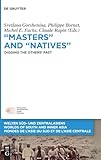“Masters” and “Natives” : Digging the Others’ Past / ed. by Philippe Bornet, Michel E. Fuchs, Claude Rapin, Svetlana Gorshenina.
Material type: TextSeries: Welten Süd- und Zentralasiens / Worlds of South and Inner Asia / Mondes de l'Asie du Sud et de l'Asie Centrale : Im Auftrag der Schweizerischen Asiengesellschaft / On behalf of the Swiss Asia Society / Au nom de la Société Suisse-Asie ; 8Publisher: Berlin ; Boston : De Gruyter, [2019]Copyright date: ©2019Description: 1 online resource (XI, 383 p.)Content type:
TextSeries: Welten Süd- und Zentralasiens / Worlds of South and Inner Asia / Mondes de l'Asie du Sud et de l'Asie Centrale : Im Auftrag der Schweizerischen Asiengesellschaft / On behalf of the Swiss Asia Society / Au nom de la Société Suisse-Asie ; 8Publisher: Berlin ; Boston : De Gruyter, [2019]Copyright date: ©2019Description: 1 online resource (XI, 383 p.)Content type: - 9783110597066
- 9783110597127
- 9783110599466
- 934.0072 23/ger
- online - DeGruyter
- Issued also in print.
| Item type | Current library | Call number | URL | Status | Notes | Barcode | |
|---|---|---|---|---|---|---|---|
 eBook
eBook
|
Biblioteca "Angelicum" Pont. Univ. S.Tommaso d'Aquino Nuvola online | online - DeGruyter (Browse shelf(Opens below)) | Online access | Not for loan (Accesso limitato) | Accesso per gli utenti autorizzati / Access for authorized users | (dgr)9783110599466 |
Frontmatter -- Acknowledgements -- Contents -- Note on Transliteration -- Preface -- Introduction -- Archaeology in the Time of Empires: Unequal Negotiations and Scientific Competition -- “Masters” Against “Natives”: Edward Daniel Clarke and the “Theft” of the Eleusinian “Goddess” -- Russian Archaeologists, Colonial Administrators, and the “Natives” of Turkestan: Revisiting the History of Archaeology in Central Asia -- The “Maîtres” of Archaeology in Eastern Turkestan: Divide et Impera -- “Master” / “Native”: Are There Winners? A Micro-History of Reciprocal and Non-Linear Relations -- Subverting the “Master”–“Native” Relationship: Dragomans and Their Clients in the Fin-de-Siècle Middle East -- In the Service of the Colonizer: Leon Barszczewski, Polish Officer in the Tsarist Army -- “The General and his Army”: Metropolitans and Locals on the Khorezmian Expedition -- Taming the Other’s Past: The Eurocentric Scientific Tools -- From the Emic to the Etic and Back Again: Archaeology, Orientalism, and Religion from Colonial Sri Lanka to Switzerland -- Legislation and the Study of the Past: The Archaeological Survey of India and Challenges of the Present -- Early Archaeology in a “Native State”: Khans, Officers, and Archaeologists in Swat (1895–1939), with a Digression on the 1950s -- The Forging of Myths: Heroic Clichés and the (Re-)Distribution of Roles -- Archaeologists in Soviet Literature -- Archaeology and the Archaeologist on Screen -- Reversal of Roles in Postcolonial and Neocolonial Contexts: From a Relation between “Masters” and “Subordinates” to “Partnership”? -- From Supervision to Independence in Archaeology: The Comparison of the Iranian and the Afghan Strategy -- The Postcolonial Rewriting of the Past in North and South Korea Following Independence (1950s–1960s) -- Excavating in Iran and Central Asia: Cooperation or Competition? -- Publishing an Archaeological Discovery astride the “North”–“South” Divide (On an Example from Central Asia) -- Role Reversal: Hindu “Ethno-Expertise” of Western Archaeological Materials
restricted access online access with authorization star
http://purl.org/coar/access_right/c_16ec
The book focuses on the relational dynamic between “masters” and “natives” in the construction of scholarly narratives about the past, in the fields of archeology, history or the study of religions. Reconsidering the role of subaltern actors that recent postcolonial studies have tended to ignore, the present book emphasizes the complex relations between representatives of the imperial power and local actors, and analyzes how masters and natives (and their respective cultures) have shaped each other in the course of the interaction. Through various vectors of intercultural transfer and knowledge exchange, through the circulation of ideas, techniques and human beings, new visions of the past of extra-European regions emerged, as did collective memories resulting from various kinds of appropriations. In this framework, the most important question is how these dynamic processes determined collective memories of the past in plural (post-)colonial – in particular, Asian – worlds, participating to the construction of national/imperial/local identities and to the reinvention of traditions.
Issued also in print.
Mode of access: Internet via World Wide Web.
In English.
Description based on online resource; title from PDF title page (publisher's Web site, viewed 28. Feb 2023)


